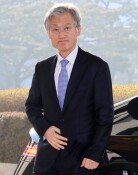Korea faces Japan-style crisis of low growth, interest rates
Korea faces Japan-style crisis of low growth, interest rates
Posted December. 10, 2012 08:21,
The outlook for Koreas economic growth has gotten bleak in the face of low growth and low interest rates, with the country facing a precarious situation similar to that of Japan two decades ago.
Despite low interest rates, risk aversion by companies has further slowed down the economy. Certain high-ranking officials in economic ministries said the Korean economy even faces what Japan did in the initial stage of its long-term slowdown over the past 20 years.
In the 1990s, Japan experienced low growth and low interest rates, something similar to what Korea has been experiencing. Korea must brace itself for the challenges Japan had to face, said Kwon Hyouk-se, chairman of the government watchdog Financial Supervisory Service, in a meeting with reporters Friday at the organization`s headquarters in Seoul.
The collapse of major Japanese insurers in the early 90s occurred due to heavy losses from deteriorated profitability and low interest rates after the real estate bubble burst, which led to the lost 20 years of the Japanese economy.
The Korean economy is apparently following suit. The net profit of Korean banks in this year`s first three quarters was 7.5 trillion won (6.9 billion U.S. dollars), down 39 percent from the same period last year. The number of new insurance contracts also shrank to 70,921,490, the lowest since 2005.
Against this backdrop, the financial watchdog set up a task force to perform case studies on Japan to estimate the effects of low interest rates, low growth and an aging society on financial institutions.
The only way to break this vicious cycle is corporate investment, but the outlook is not rosy. According to an economic outlook for next year by the Korea Employers Federation, the number of CEOs who said their companies will tighten their belts next year rose 9.1 percentage points from last year to 51.2 percent. The crisis index was 102 percent, meaning that more CEOs say the economy is facing a crisis more serious than the one that rocked the world in 2008.
Yoo Byeong-gyu, senior economist at Hyundai Research Institute in Seoul, said, This is because `economic democratization,` a politically motivated social issue, along with uncertainty in the global economy have negatively impacted investment and hiring by companies."
Korean expectations for next years business prospects have also rapidly declined. A study by the Federation of Korean Industries found that 70 percent of Koreans believe the economy will grow about the same as this year or lower.
The Korean government no longer expects an economic turnaround after the third quarter this year. Instead, it will cut its forecast for next years growth from 4 percent and release a modified estimate after the presidential election on Dec. 19.
abc@donga.com





![[천광암 칼럼]장동혁은 대체 왜 이럴까](https://dimg.donga.com/c/138/175/90/1/wps/NEWS/IMAGE/2026/02/22/133399127.1.jpg)

